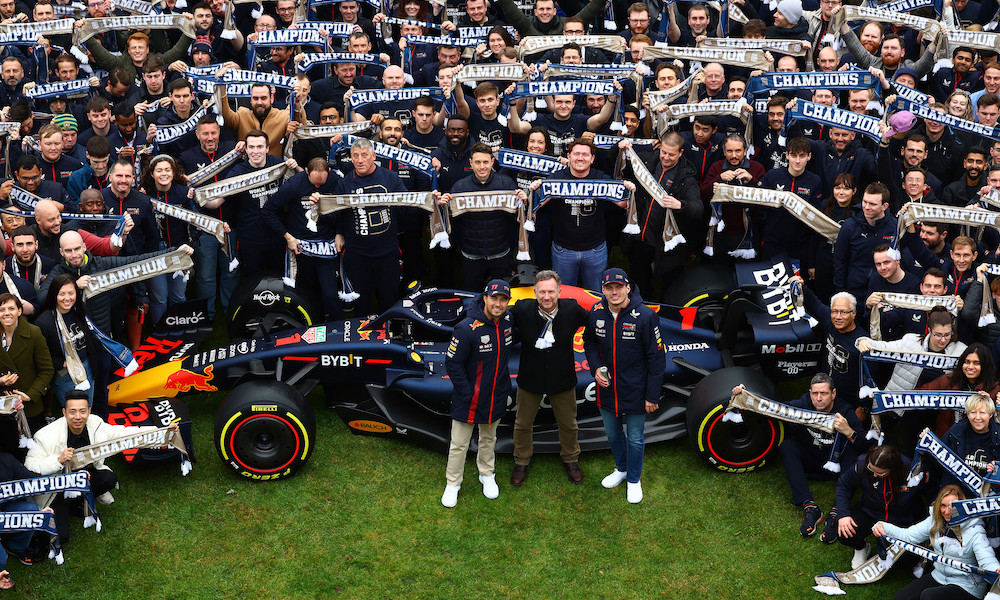
It’s that time of year again, when the previous season starts to disappear into the rear-view mirror and the calendar ticks over with a new number at the end of it to kick off anticipation for the next campaign. So as we prepare to say goodbye to 2023, let’s reflect on each team’s strengths and weaknesses.
RED BULL
The good: Looking back at how I called last year’s level of performance “remarkable”, it’s astonishing that Red Bull has moved the goalposts so much further this time around. The car itself was extremely strong, but its true advantage was in its all-round abilities. Reliability was rock solid, pit stops were consistently rapid, strategy was on point and Max Verstappen exploited it all to the maximum in a stunning display of driver and team harmony.
The bad: There’s hardly anything you can put in this category this year, but perhaps Sergio Perez’s performances need more attention. Red Bull seems to think it can find ways of getting him performing more consistently, and while Verstappen stepped up another level, the Perez of the first few races was not the Perez of the majority of the rest of the season. Oh, and Singapore. One off weekend leaves a tiny bit of room for improvement.
RATING: 10/10
MERCEDES
The good: Mercedes is one position higher up than it was a year ago, and that was built on a first part of the year where it was regularly the third-fastest car while other teams moved around more erratically. It also seemed to have a more comfortable Lewis Hamilton this year than last, and that translated into a tilt at second in the drivers’ championship that would have been a significant achievement if he’d pulled if off and gotten the better of a Red Bull.
The bad: Lessons weren’t learned with the car concept and Mercedes was no closer to Red Bull, admitting its faults immediately during the first race weekend. While Hamilton looked closer to his best, George Russell struggled more, and there wasn’t a victory for the first time since 2011. Fewer points resulted in second overall, and even that was due to the inconsistency of others opening the door more than Mercedes making gains.
RATING: 7/10
FERRARI
The good: This was a year when Ferrari actually showed some really positive signs, despite losing out to Mercedes in the end. Unlike 2022, the car got better as the year went on, and the team found more consistency as well as making fewer strategic errors. Carlos Sainz took an excellent win in Singapore and had a more consistent year than Charles Leclerc, but the latter had the majority of the team’s seven pole positions and looked back to his best in the final stages.
The bad: The first part of the season was not good, and Ferrari didn’t really kick on from last year’s platform initially – although managerial changes could have produced instability on that front. Reliability was also poor in a time of frozen power unit regulations, with two failures to start a race in the final six rounds ultimately costing it second place to Mercedes.
RATING: 7.5/10
McLAREN
The good: Let’s be honest, the car development was pretty incredible, as McLaren went from being a regular Q1 casualty to fighting for podiums, pole positions and even being in the frame for victory on a few occasions. Pair that with another extremely strong season from Lando Norris and a hugely impressive first year from Oscar Piastri – including a Sprint win in Qatar – and there’s a lot of momentum behind Andrea Stella and his team.
The bad: To be blunt, where McLaren started the year was terrible, and suggests the team was not in a great place prior to the team leadership changes. There were still a few off weekends too, though not many, and the door was almost reopened to Aston Martin in the final few rounds. It would be unfair to cite a few qualifying mistakes from Norris as being overly costly, but tied to the odd bit of poor execution and there are areas to clean up on both sides.
RATING: 8.5/10
ASTON MARTIN
The good: After a good year of development last year from a low starting point, it was a complete reversal in 2023. The car was excellent out of the box and transformed Aston into Red Bull’s nearest challenger early on, with Fernando Alonso in stunning form all year. To go from 55 points in 2022 to 280 this year – with eight podiums within that – is sensational progress over the entire period.
The bad: What that progress hides is the overall slide from competitiveness as the season went on. Of the eight podiums, six were scored in the first eight rounds, and the car’s performance did not always keep up with Alonso’s level. Lance Stroll also had a really damaging slump alongside the car struggles, without which Aston Martin would almost certainly have held McLaren off for fourth overall after enjoying such a head start.
RATING: 7.5/10
ALPINE
The good: There was a real balance to Alpine in the sense that its drivers were separated by just four points come the end of the season, and both Esteban Ocon and Pierre Gasly picked up a podium finish. Those standout results also came when the team’s back appeared to be against the wall amid upheaval or controversy, and the latter part of the season did see a largely more stable team.